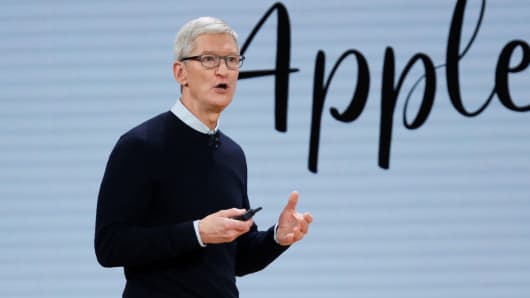A note from Mirabaud analyst Neil Campling suggests that Apple is going to kill the iPhone X this year. It might be true that the phone will be upgraded, but it's not "dead." Instead, I think what we're seeing is more of a reflection of Apple's new strategy in response to slowing growth in the phone market.
Let's back up: Campling said there's oversupply of chips from companies such as Taiwan Semiconductor Manufacturing Co. (TSMC), which suggests that Apple hasn't been buying them to include in the iPhone X. As a result, Campling said "the iPhone X is dead."
Campling also told CNBC that the iPhone X, priced at $999, is "too expensive" and that "consumers are turning their backs on high-priced smartphones."
But Apple has said the opposite.
In February, for example, Tim Cook said the iPhone X beat Apple's expectations. "IPhone X was our most popular iPhone, despite not beginning to ship until November," Cook told CNBC's Josh Lipton and Jim Cramer. "We found out in the last few days that analysis tells us that it was the best selling smartphone in the world last quarter. And so we could not be more pleased with the reception of it." Combined with sales of the iPhone 8 and iPhone 8 Plus, Apple said it set a new iPhone revenue record during the company's fourth quarter.
Demand for new phones has waned across the board. TrendForce said the smartphone market is facing slower growth, with phone production estimated at 1.5 billion units for 2018. That's growth of just 2.8 percent from 2017, TrendForce said, lower than the 5 percent growth it originally expected.
That would also explain why there may be decreased demand from chip suppliers in general.
TSMC, a key Apple supplier, offered lower guidance earlier this week, with a forecast range for the second quarter falling between $7.8 billion and $7.9 billion, about a billion below Wall Street's estimates. Campling said the surplus "has never been higher" in the decade he's been tracking TSMC's supply.
Morgan Stanley analyst Charlie Chan said this is due to a mix of factors, not just because of decreased demand for the iPhone X.
While Chan agrees it's partially because of order cuts for iPhone X components, he also said that Morgan Stanley believes the lowered guidance can be attributed to two other issues.
"Beside the order cuts from the current Apple iPhone X processor, we attribute the major revenue shortfall in the smartphone segment to key customer MediaTek ... and around a month's delay of Apple's new 7nm processor to July," Chan said.
MediaTek provides chips for several major phone makers, particularly in emerging markets such as China where MediaTek processors are included in more affordable phones.
Apple's strategy has also changed.
Apple typically keeps its older phones around and sells them for lower prices, but the iPhone X is different. It launched a newer high-end model that stood above Apple's more traditional iPhone 8 and iPhone 8 Plus products. Perhaps Apple will keep those phones in its inventory while swapping out the iPhone X for a newer, more advanced model.
"The word 'killed' doesn't make any sense at all," Patrick Moorhead, president and principal analyst of Moor Insights & Strategy, told CNBC. "The iPhone X was Apple's most expensive phone and the company sold, in units, more than any of its other phones, so I'd say it's a success. Apple will update the iPhone X, but won't kill it. The suppliers impacted have likely been replaced by another supplier so their numbers are going down."
KGI analyst Ming-Chi Kuo has suggested Apple has three new iPhones in the works, including one that might be an upgrade from the iPhone X with a larger screen.
If that happens, Apple will replace the iPhone X with a newer model — because it knows there's consumer interest in the product, not because the iPhone X needed to be killed or was unsuccessful.
— CNBC's Arjun Kharpal and Tae Kim contributed to this report.



